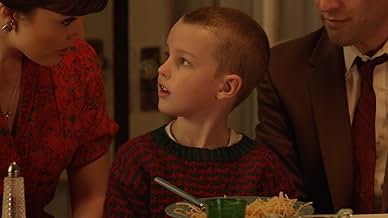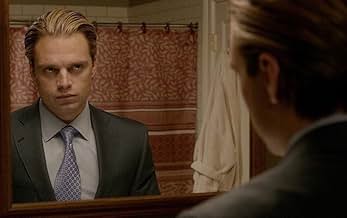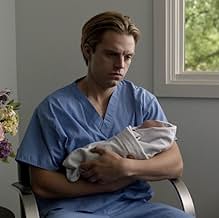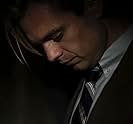AVALIAÇÃO DA IMDb
5,6/10
1,9 mil
SUA AVALIAÇÃO
Um homem luta com as trágicas memórias de seu passado para entender o presente, mas logo percebe que o tempo não é o inimigo que pensa que é.Um homem luta com as trágicas memórias de seu passado para entender o presente, mas logo percebe que o tempo não é o inimigo que pensa que é.Um homem luta com as trágicas memórias de seu passado para entender o presente, mas logo percebe que o tempo não é o inimigo que pensa que é.
- Direção
- Roteiristas
- Artistas
- Prêmios
- 5 indicações no total
- Direção
- Roteiristas
- Elenco e equipe completos
- Produção, bilheteria e muito mais no IMDbPro
Avaliações em destaque
I'm Not Here is a somber, introspective drama that explores themes of grief, regret, and the passage of time. J. K. Simmons delivers a deeply emotional performance as a man haunted by his past, portraying pain and isolation with remarkable subtlety. The film's nonlinear storytelling, weaving between past and present, adds depth to the narrative but at times feels disjointed, making it difficult to fully connect with the characters.
The cinematography and atmosphere effectively enhance the film's melancholic tone, and there are moments of genuine emotional weight. However, the pacing can be slow, and some scenes feel repetitive, making it a film that requires patience. The story's message about personal responsibility and redemption is thought-provoking, yet the execution lacks the impact needed to make it truly memorable.
I'm Not Here is a film with strong performances and a heartfelt story, but it struggles with its structure and pacing. While it won't resonate with everyone, those who appreciate slow-burning character studies may find something meaningful in its quiet reflection on life's choices.
The cinematography and atmosphere effectively enhance the film's melancholic tone, and there are moments of genuine emotional weight. However, the pacing can be slow, and some scenes feel repetitive, making it a film that requires patience. The story's message about personal responsibility and redemption is thought-provoking, yet the execution lacks the impact needed to make it truly memorable.
I'm Not Here is a film with strong performances and a heartfelt story, but it struggles with its structure and pacing. While it won't resonate with everyone, those who appreciate slow-burning character studies may find something meaningful in its quiet reflection on life's choices.
What I liked about this film: the acting was excellent, very evocative of the emotions of the situations being shown.
But I'm not sure what exactly happened in certain scenes. I guess we're supposed to assume the details don't really matter or that he's so drunk he can't remember or doesn't want to remember. The ending is what confused me the most. Was he imagining something that he wished had happened, or just felt better knowing that's what he would do if he could?
I suppose this film will appeal to people who had alcoholics in their family. I didn't, so unfortunately, it was a bit too confusing for me.
But I'm not sure what exactly happened in certain scenes. I guess we're supposed to assume the details don't really matter or that he's so drunk he can't remember or doesn't want to remember. The ending is what confused me the most. Was he imagining something that he wished had happened, or just felt better knowing that's what he would do if he could?
I suppose this film will appeal to people who had alcoholics in their family. I didn't, so unfortunately, it was a bit too confusing for me.
This film was a thinker. You have to make yourself think, and when you think you know what will happen, you are wrong. You wish you weren't, but sadly, you were wrong. Great film. JK Simmons was epic, and he didn't have to say anything. He just emoted through his role, and I felt for him -- hook, line and sinker. Sebastian Stan is good, sells us his 'version' of Steve, and we pay it. Iain Armitage is wondrous as Little Stevie, and is the future of Hollywood.
As a mature adult male, I saw so many parallels to my own life/loves/mistakes/regrets that it was hard to watch at some points. But isn't that what good films can do? Take you so deep into the character (J.K.Simmons is great!) that you feel their pain. A must see for anyone who's ever made a mistake in their life and felt alone.
Greetings again from the darkness. So many are haunted by the past - unable to move beyond either having been dealt a bad hand or having created one through their own actions. The film opens on a gaunt Steve (JK Simmons), alone in his apartment, and seemingly barely functioning. He is contemplating suicide with a shiny gun he keeps on a coffee table in a home as unkempt as himself. His only breaks are to frantically search the house for another bottle of vodka, or to listen to a phone message that kicks off yet another painful memory.
The film features three timelines for Steve: the despondent, suicidal elder; the twenties and thirties version (Sebastian Stan); and the 1960's childhood Stevie (Iain Armitage, "Young Sheldon"). Those young years for Stevie recall his always-annoyed mom (Mandy Moore) and his fun-loving dad (Max Greenfield), while the young adult years show us his romance and marriage with Karen (Maika Monroe). It's not long before we recognize the common thread that binds the timelines: alcoholism. First his dad's, then his own.
Our memories tend to return in moments and flashes of events. This becomes more evident and the memories less reliable when years of alcohol abuse are in play. The flashes include the courtroom and judge of his parents' divorce, his dad drinking, his own courting of Karen and the booze that accompanied it, the dissolution of his own marriage, and an unspeakable tragedy that ruined his life without taking it ... something he is looking to remedy with that gun.
JK Simmons is remarkable here. His Steve is mired in loneliness, depression, guilt, and regrets - each amplified through booze. Simmons' performance offers up not a single line of dialogue. He never leaves the apartment. He never has human interaction. Yet despite all of this, he never leaves our thoughts as he pinballs through his memories. Mr. Stan and Ms. Monroe provide the most telling scene outside of Simmons' segments. Notice the difference in demeanor as he tells her he heard the shot when his dad killed himself vs how she states her mother died from cancer. This is the contrast of moving on no matter what life serves up, or being burdened with that weight forever.
The film was directed by Mr. Simmons' wife Michelle Schumacher, and she co-wrote the screenplay with Tony Cummings (son of Emmy winning actor Robert Cummings). Mr. Cummings also appears as the judge in the divorce hearing. The film was originally shown in 2017, but is only now getting released. For fans of JK Simmons, it's a must see.
The film features three timelines for Steve: the despondent, suicidal elder; the twenties and thirties version (Sebastian Stan); and the 1960's childhood Stevie (Iain Armitage, "Young Sheldon"). Those young years for Stevie recall his always-annoyed mom (Mandy Moore) and his fun-loving dad (Max Greenfield), while the young adult years show us his romance and marriage with Karen (Maika Monroe). It's not long before we recognize the common thread that binds the timelines: alcoholism. First his dad's, then his own.
Our memories tend to return in moments and flashes of events. This becomes more evident and the memories less reliable when years of alcohol abuse are in play. The flashes include the courtroom and judge of his parents' divorce, his dad drinking, his own courting of Karen and the booze that accompanied it, the dissolution of his own marriage, and an unspeakable tragedy that ruined his life without taking it ... something he is looking to remedy with that gun.
JK Simmons is remarkable here. His Steve is mired in loneliness, depression, guilt, and regrets - each amplified through booze. Simmons' performance offers up not a single line of dialogue. He never leaves the apartment. He never has human interaction. Yet despite all of this, he never leaves our thoughts as he pinballs through his memories. Mr. Stan and Ms. Monroe provide the most telling scene outside of Simmons' segments. Notice the difference in demeanor as he tells her he heard the shot when his dad killed himself vs how she states her mother died from cancer. This is the contrast of moving on no matter what life serves up, or being burdened with that weight forever.
The film was directed by Mr. Simmons' wife Michelle Schumacher, and she co-wrote the screenplay with Tony Cummings (son of Emmy winning actor Robert Cummings). Mr. Cummings also appears as the judge in the divorce hearing. The film was originally shown in 2017, but is only now getting released. For fans of JK Simmons, it's a must see.
Você sabia?
- CuriosidadesJ.K. Simmons never says one word during the entire movie.
- Cenas durante ou pós-créditosThere is one more scene after the ending credits.
- ConexõesReferenced in Late Night with Seth Meyers (2014)
- Trilhas sonorasNot Who We Were
Composed and Performed By Em Beihold
Principais escolhas
Faça login para avaliar e ver a lista de recomendações personalizadas
- How long is I'm Not Here?Fornecido pela Alexa
Detalhes
- Data de lançamento
- País de origem
- Idioma
- Também conhecido como
- Burada Değilim
- Locações de filme
- Empresa de produção
- Consulte mais créditos da empresa na IMDbPro
- Tempo de duração
- 1 h 21 min(81 min)
- Cor
Contribua para esta página
Sugerir uma alteração ou adicionar conteúdo ausente



















